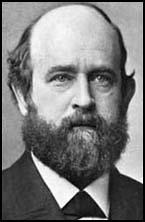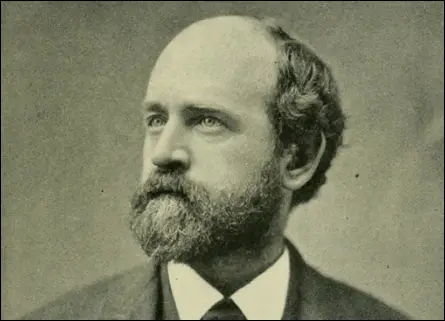Henry George

Henry George, the second of ten children, was born in Philadelphia, Pennsylvania on 21st September 1839. He left school at 14 and went to sea as a foremast boy in April 1855. On his return he settled in California where he became a typesetter and printer.
By the 1860s he wrote for several newspapers and eventually became the owner of the San Francisco Evening Post. George was a crusading reporter who was later to have a considerable influence on a generation of investigative journalists such as Benjamin Flower, Frank Norris, Ida Tarbell, Charles Edward Russell, Lincoln Steffens, David Graham Phillips, C. P. Connolly, Upton Sinclair and Ray Stannard Baker.
In 1870 George published Our Land and Land Policy. In the book he developed the philosophy and economic ideology known as Georgism. He argued that everyone owns what he or she creates, but that everything found in nature, most importantly land, belongs equally to all humanity.
Henry George followed this with Progress and Poverty (1877). In the book he tried to explain the growing gap between rich and poor. "The reason why, in spite of the increase of productive power wages constantly tend to a minimum which will give but a bare living, is that, with increase in productive power, rent tends to even greater increase, thus producing a constant tendency to the forcing down of wages."
George went on to argue: "It is true that wealth has been greatly increased, and that the average of comfort, leisure and refinement has been raised; but these gains are not general. In them the lowest class do not share. This association of poverty with progress is the great enigma of our times. There is a vague but general feeling of disappointment; an increased bitterness among the working classes; a widespread feeling of unrest and brooding revolution. The civilized world is trembling on the verge of a great movement. Either it must be a leap upward, which will open the way to advances yet undreamed of, or it must be a plunge downward which will carry us back toward barbarism."
In these two books George argued that the gap between the rich and the poor could only be closed by replacing the various taxes levied on labour and capital with a single tax on the value of property. Paul Thompson argues in his book, Socialist, Liberals and Labour (1967) that the book resulted in the growth in socialism: "The real socialist revival was set off by Henry George, the American land reformer, whose English campaign tour of 1882 seemed to kindle the smouldering unease with narrow radicalism. This radical voice from the Far West of America, a land of boundless promise, where, if anywhere, it might seem that freedom and material progress were secure possessions of honest labour, announced grinding poverty, the squalor of congested city life, unemployment, and utter helplessness."

James Keir Hardie also read Progress and Poverty. His friend Philip Snowden later argued: "Keir Hardie told me that it was Progress and Poverty which gave him his first ideas of socialism... No book ever written on the social problem made so many converts. Economic facts and theories have never been presented in such an attractive way. Although Henry George was not a socialist, his book led many of his readers to socialism."
Tom Mann was a trade union leader who read Progress and Poverty: "In 1886 I read Henry George's book, Progress and Poverty. This was a big event for me; it impressed me as by far the most valuable book I had so far read. It enabled me to see more clearly the vastness of the social problem, to realize that every country was confronted by it... His book was a fine stimulus to me, full of incentive to noble endeavour, imparting much valuable information, throwing light on many questions of real importance, and giving me what I wanted - a glorious hope for the future of humanity, a firm conviction that the social problem could and would be solved. I must again give a reminder that Socialism was known only to a few persons, and that no Socialist organization existed at that time."
Henry Snell agreed: "I was one of the many thousands of young men whose political and social views were greatly stimulated by Henry George's famous book Progress and Poverty, which, if measured by the breadth and the depth of its influence on the thoughtful workmen of the eighties, must be considered as one of the greatest political documents of that generation."
Progress and Poverty sold over two million copies. George made six lecture tours of Europe where there was more interest in his views than in the USA. Philip Snowden was one of those who saw him in England: "Henry George had a very impressive platform style. In appearance he was of middle height, well built, had a full, brown beard, and would have passed for a Nonconformist minister. His style of speaking was conversational, rather than oratorical."
As well as writing for magazines such as Arena in the United States, George published several more books including Social Problems (1883), Protection or Free Trade (1886), Perplexed Philosopher (1892) and Science of Political Economy (1897).
Henry George died on 29th October, 1897. An estimated 100,000 people attended the funeral.
Primary Sources
(1) Henry George, Progress and Poverty (1879)
The reason why, in spite of the increase of productive power wages constantly tend to a minimum which will give but a bare living, is that, with increase in productive power, rent tends to even greater increase, thus producing a constant tendency to the forcing down of wages.
(2) Henry George, Progress and Poverty (1879)
It is true that wealth has been greatly increased, and that the average of comfort, leisure and refinement has been raised; but these gains are not general. In them the lowest class do not share. This association of poverty with progress is the great enigma of our times. There is a vague but general feeling of disappointment; an increased bitterness among the working classes; a widespread feeling of unrest and brooding revolution. The civilized world is trembling on the verge of a great movement. Either it must be a leap upward, which will open the way to advances yet undreamed of, or it must be a plunge downward which will carry us back toward barbarism.
(3) Tom Mann, Memoirs (1923)
In 1886 I read Henry George's book, Progress and Poverty. This was a big event for me; it impressed me as by far the most valuable book I had so far read. It enabled me to see more clearly the vastness of the social problem, to realize that every country was confronted by it.
Henry George's cure for economic problems, as advocated in Progress and Poverty is the Single Tax. I could not accept all George's claims on behalf of his proposal, though for lack of economic knowledge I was unable to refute these claims.
His book was a fine stimulus to me, full of incentive to noble endeavour, imparting much valuable information, throwing light on many questions of real importance, and giving me what I wanted - a glorious hope for the future of humanity, a firm conviction that the social problem could and would be solved. I must again give a reminder that Socialism was known only to a few persons, and that no Socialist organization existed at that time.
(4) Philip Snowden, An Autobiography (1934)
I heard Henry George just before Progress and Poverty had been published, a book which had made a tremendous impression in the United States and Great Britain. Henry George was having something of a triumphal tour through Scotland. The Scottish Radicals had been captured by the theories he had advanced in Progress and Poverty.
No book ever written on the social problem made so many converts. Economic facts and theories have never been presented in such an attractive way. Although Henry George was not a socialist, his book led many of his readers to socialism. Keir Hardie told me that it was Progress and Poverty which gave him his first ideas of socialism.
Henry George had a very impressive platform style. In appearance he was of middle height, well built, had a full, brown beard, and would have passed for a Nonconformist minister. His style of speaking was conversational, rather than oratorical.
(5) Henry Snell, Men Movements and Myself (1936)
I was one of the many thousands of young men whose political and social views were greatly stimulated by Henry George's famous book Progress and Poverty, which, if measured by the breadth and the depth of its influence on the thoughtful workmen of the eighties, must be considered as one of the greatest political documents of that generation.

